A version of this Post was published on Andhra Cultural Portal on March 12, 2015
It is often said that money is the root of all evil. Some even point to lust as its origin. But the reality is that it is Selfishness: svaartha, that privileging of one’s own inclinations, interests, and desires above others, that is the true root of evil.

We’ve all seen the characters or come across such behaviour. The stubborn fellow who has to have his way, others be damned. The spendthrift wife who runs up her husband’s debt. The brutish husband that neglects his wife’s needs. The bulldozing billionaire fat cat who disregards the welfare of the community. The ambitious politician who destroys his own society. All these examples are ingredients in the destruction of civilization. All represent unrestrained selfishness, Nihit Svaartha.
https://www.youtube.com/watch?v=N03YNGPUkaU
In our era of instant gratification, competition, and survival-of-the-fittest, many of our sophists and pseudo-philosophers may decry this deconstruction of selfishness as an attack on the “liberty of the individual” and an”obstruction of the talented“. The even more infantile may cry “John Galt!” like so many infants in a nursery. But the reality is such personages neither have a concept of liberty nor know what it truly means to be a member of society. Such self-absorbed troglodytes are all too happy to feed at the trough of publicly provided positive externalities (from schooling to roads to national defense), when it suits them, but balk at having to give back to their communities, help the needy, or even look after their extended families. Indeed, what they are really asking for is not the liberty to be unoppressed, but the freedom to exploit and to harm as they will. In short, what they are in fact demanding is license and licentiousness.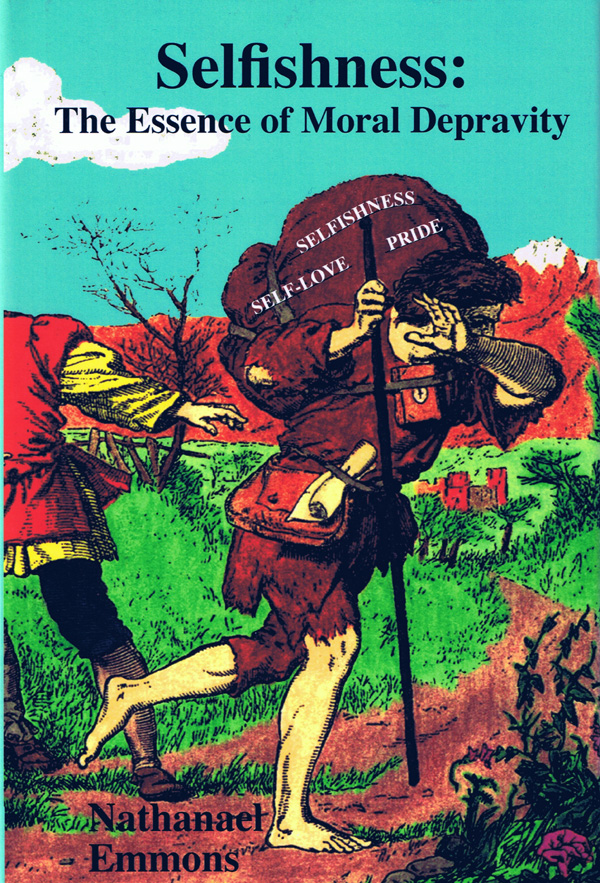
All human beings experience various desires and temptations. Men tend to be more prone to lust, and women to money (though we increasingly see the reverse these days), but both experience temptation in the process. Nevertheless, it is the recognition of the rights of others and their mutual claim to Respect, that causes the person of conscience to curtail and ultimately master his or her desires.
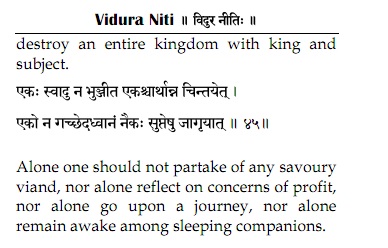 Destructive natures are brought about when individuals begin privileging their own needs and interests above the rest of society. Indeed, Duryodhana is the classic example of this. For all his sins, he had a number of good qualities as well (such as generosity to his friends), but even these qualities were all ultimately subject to his Nihit Svaartha. It is this inability to put society above self that leads to destruction.
Destructive natures are brought about when individuals begin privileging their own needs and interests above the rest of society. Indeed, Duryodhana is the classic example of this. For all his sins, he had a number of good qualities as well (such as generosity to his friends), but even these qualities were all ultimately subject to his Nihit Svaartha. It is this inability to put society above self that leads to destruction.
https://youtu.be/9lKfgTuJc-0?t=32m46s
However, one need not turn to the Mahabharata to see selfishness on display. This ghor kaliyug is itself the manifestation of selfishness, so much so that pseudo-philosophers have verily turned it into a virtue…
Some may be wondering, “Why this upadesh?”, “We all can’t be saints”, “One must be selfish to survive!“. But what they fail to realize is that selfishness not only affects those around them, but affects even politics and the destinies of nations. It is selfishness that drives an individual to privilege his ambition over the needs of the common good.
Some of our half-educated half-reads may declare “Vell, Adam Smith said invisible hand vill guide us—let each man pursue his self-interest! Fight for your right!”. But these morons have neither read Smith nor understand his philosophy.
First off, he didn’t speak of naked self-interest, but ENLIGHTENED self-interest. This means that an individual should weigh his interests in line with the common good. An example of this is the telecom debacle, where wealthy businessmen were advocating on behalf of foreign equipment manufacturers because…it was profitable. Even government officials were toeing this line. They cared nothing for the national security ramifications of giving possible future adversaries access to government lines of communication. So where then is this alleged “virtue of selfishness”?
Second, even before he wrote the Wealth of Nations, Smith composed the Theory of Moral Sentiments. Many of our videsh-returned wunderkinds believe they’ve unlocked the secret to wealth creation in Italian suits, Milton Friedman, and iPhones. Indeed, a number of them have even opened up revenue generating retirement homes and grossly profitable gated communities to replicate their MBA model in India. But let’s take a look again at what the patron saint of Capitalism himself wrote in his earlier work:
“The laws of all civilized nations oblige parents to maintain their children, and children to maintain their parents, and impose upon men many other duties of beneficence”—Adam Smith TMS, p.81
Thus, even the philosophical poster boy for profit has advocated the importance of duty and beneficence (i.e. generosity, unselfish action), to one’s parents, children, and fellow man. As such, calculation of one’s interest cannot be in a vacuum. Self-interest must be weighed with societal interest. Even when the cause is just, one must ask whether correction is advocated in the correct way. The current documentary controversy is perfectly illustrative of this selfishness.
Many of our half-educated shrilly cry that the documentary should not be banned. FOE is being infringed as is their right to watch (leave aside traditional speech law on defamation, obscenity, and time/place/manner restrictions). What’s more, some of our youth feel this is precisely what is needed to shake up chauvinism and rowdy-ism they’ve experienced in their lives. And that is precisely the problem: this perspective only looks at the issue from the immediate view, rather than the societal one. It refuses to take into account data showing lower rates of violence, higher rates of conviction, and under-reporting even higher in other countries. The immediate self-centered emotion of avenging personal injustice is privileged above national interest, even if their Fathers, Brothers, Husbands, and Sons are unfairly tarred and stereotyped, and culture, illogically labeled.
Now, to be sure, violence against women is indeed a problem, as is staring/leering. And others will declare that fighting crime against women is societal interest too (it most definitely is). But is the way to combat this by playing into the hands of the nation’s adversaries? One need not be some paranoid theorist to say that there are parties interested in smearing India’s culture.
For those wondering precisely how invaders were finally able to establish kingdoms in India during the medieval period, they need only see the laundry list of alleged nationalists speaking out in support of this documentary. Like the Sindhi Kshatriyas angry at the rule of the Brahmin Raja Dahir, they gave their support to foreigners they stupidly thought would be fighting their just cause for them. Because you see, these videshis must really be acting out of a sense of “justice”…cause they really care!…so darn much! It is this gullible stridency in both men and women that makes it next to impossible to get anything constructive done. But then again, unrepentant stupidity has been almost an uniquely Indian quality for the past few centuries.

The infuriating and sinful disrobing of Draupadi fueled not only the Pandavas’, but Krishna’s desire for the destruction of the Kauravas. However, even Krishna achieved justice for Draupadi after weighing all the factors: When, Where, How, Who, What, Why. He did not merely advocate war immediately. He took into account the factors against and even tapasya required on the part of the Pandavas, before, in the name of all women, Duryodhana and Dushasana could be brought to justice. And brought to justice they were, in the most terrible of fashions. But this was achieved and societal attitudes corrected because even an humiliated and vengeful Draupadi patiently listened to the wisdom of Sri Krishna. Rather than putting her cause above Dharma, she focused on Dharma, which in due time, gave her the justice she so richly deserved. That is because, no matter how just the cause, weighing and prioritizing of all interests (not just one) and correction of all crimes (not just one) is required.
Indeed, it is the failure not of pursuing one’s interests, or frequently even societal interests, but the failure and stubborn refusal to prioritize interest properly that frequently leads to problems not only for societies but even for relationships.
Nothing kills a relationship as quickly and easily as does selfishness. As even tragically beaten wives and cruelly cuckholded husbands can attest, it is not ill-treatment but pure and raw selfishness that destroys relationships and makes one feel alone. Nothing numbs love like neglect.
If you only prioritize your interest. If you only care about yourself. If you only look after yourself, how can your relationship, any relationship, survive? Romance isn’t dead today because modernity makes it impossible or obsolete. Rather, the Death of Romance took place because individuals (the constituent parts of a relationship) are too selfish to make the relationship work. What self-absorbed, selfish woman (no matter how physically beautiful) will inspire the continued romantic sentiment in her husband? What selfish brute of a man can continue to retain the romantic affections of his wife? Indeed, it is not compatibility, but selfishness and brutishness, that makes a relationship impossible. Even the classic English drama Pygmalion demonstrates this.
If divorce rates are increasing, if violence against women is increasing, if isolation in society is increasing, it is because of selfishness and self-centeredness. A nation of narcissists and selfish brats will not long last. And a nation of people that know not how to prioritize, will not become strong.
As we have previously demonstrated, reliance on laws and never-ending legislation may punish criminals–but they won’t reform them or even prevent their creation to begin with. Indeed, a just society is the one that requires the fewest laws. This is because its population self-regulates its own behavior. Men restrained by Dharma do not selfishlessly justify their basest and even most violent urges, let alone enact them. Likewise for Women educated in dharma. Thus, a society’s civilization and justness is not determined by the number and complexity of its laws, but by the virtue and selflessness of its populace. This is because the selfish man sees only objects of pleasure/utility, and behaves only as much as law or threat of punishment permit him in a given place. In contrast, the selfless man behaves properly irrespective of law or punishment or place.
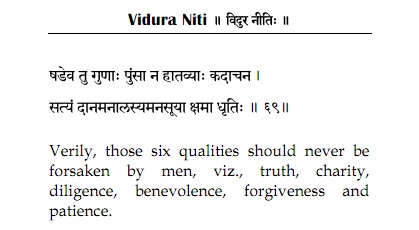 The way to dignity, justice, and respect for women is not through outside intervention, but internal reform. From Adi Sankara to Basava to Vivekananda, voices rooted in the native and indigenous were the ones that most successfully appealed to our conscience and reformed society in the process. They didn’t look to outsiders to play arbiter, benevolently guiding our destinies. They recognized that while Indians were selfish and stupid, the outsider was selfish…but smart. Rather than playing into the hands of those who wished harm, they advocated internal reform and took inspiration from our own philosophies to ensure justice to all members of society. Achara is the building block for this, because it restrains our behavior for common interest.
The way to dignity, justice, and respect for women is not through outside intervention, but internal reform. From Adi Sankara to Basava to Vivekananda, voices rooted in the native and indigenous were the ones that most successfully appealed to our conscience and reformed society in the process. They didn’t look to outsiders to play arbiter, benevolently guiding our destinies. They recognized that while Indians were selfish and stupid, the outsider was selfish…but smart. Rather than playing into the hands of those who wished harm, they advocated internal reform and took inspiration from our own philosophies to ensure justice to all members of society. Achara is the building block for this, because it restrains our behavior for common interest.
From human trafficking to acid attacks to forced intercourse to everyday run of the mill lechery, women are overwhelming the victims of indecency and violence. But no amount of legislation can completely prevent such behavior in all settings. Only good conduct, Achara, teaches men (and women) respect for others and self-restraint. Thus, the mistake of these ladies is not in speaking out, but knowing where to speak out and how to correct and willingness to listen. So why single out the present generation of young women–who, however misguided, are nevertheless justifiably upset at world-wide violence against women, when there are those without such provocation, who seek out their own agendas. Sadly, even in the ranks of those who presume to speak out in favour of or in support of dharma do so only so far as it advances their self-interests. Even our self-proclaimed patriots and social media saviors are guilty of this sin of selfishness, and have even less reason for it. Dharma is merely a flag or (temporary) party–ambition is their cause.
One of the most tragic things in any hour, but especially during a late hour, when all of society stands at a precipice, is when those who proclaim to support dharma or righteous causes, nevertheless act in a selfish and opportunist manner. Rather than think of the common good, they prioritize advancing their own personal, career, and caste interests. Rather than do the hard work of building something from scratch, they seek to bandwagon on established efforts or gain entry into fashionable salons or seek the top position, while insulting/destroying any who stand in their way. They consume rather than contribute. If stupidity is the inability to prioritize, selfishness in many ways is about a refusal to prioritize (society above self). That is the importance of dharma, not merely as a slogan or a convenient umbrella, but as a principle to be lived as part of a living culture. Thus, we once again come to culture as not only the glue for nations, but also the nurturing soil that germinates virtuous sons and daughters, selfless leaders, and strong societies.
We all experience a selfish urge, or make a mistake from time to time. The point is not to make those poor souls wear a scarlet S for all eternity, but to encourage them and encourage ourselves to hear out and think in the common societal interest, before self-interest. Therefore, all those looking for benevolent videshis to fight their cause for them would do well to read what happened to Sindh in 711 CE. The Chachnama gives plenty of lessons in just not what to do, and just what the ultimate cost of selfishness is to individuals and societies. As we’ve said before, you can be stupid, you can be selfish, but you can’t be both. As Indians are unlikely to match the sheer, diabolical shadyantras of videshis, their hope lies in being not quite so selfish. The fate of the region, country, and civilization itself, depends upon it.
Let Nishkama Karma (selfess action) be your slogan as well as solace, for it will prove ultimately to be your saviour.
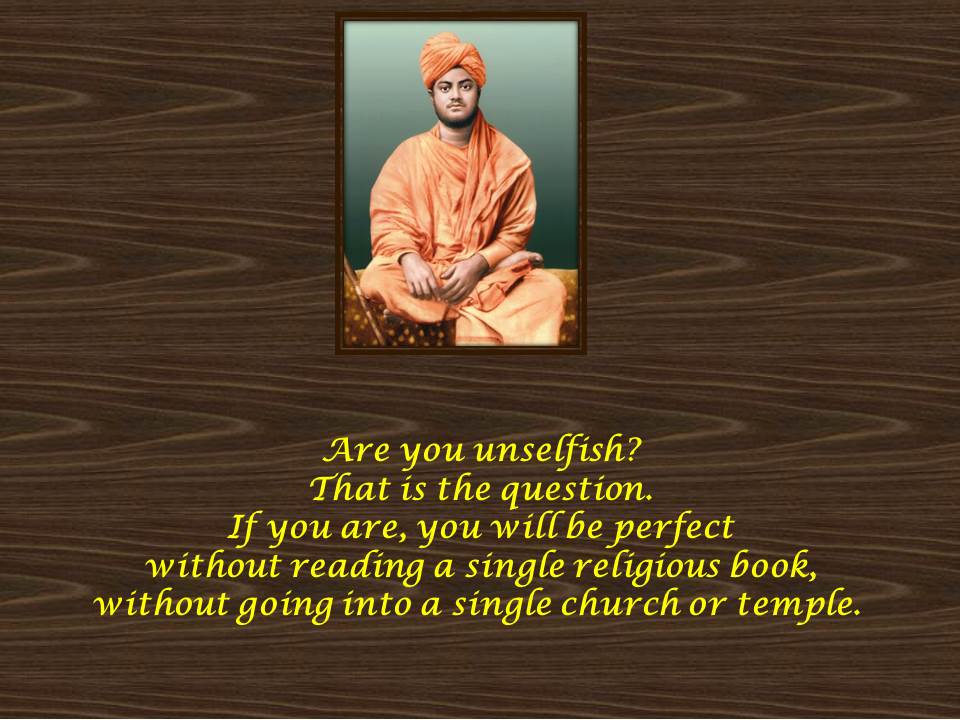
References
- Vidura Neeti
- Chachnama
- Smith, Adam. The Theory of Moral Sentiments. p.81
- http://www.globalpost.com/dispatch/india/090311/india-bangalore-morphs-silicon-valley
- http://www.thehindu.com/news/cities/Madurai/old-age-homes-the-last-resort-of-the-elderly/article4438333.ece
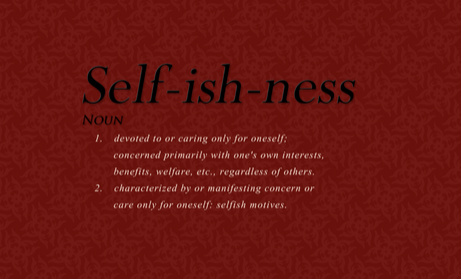




![[Reprint Post] Culture: The Cure for Stupidity](https://indicportal.org/wp-content/uploads/2016/01/3085064-Wendell-Pierce-Quote-The-role-of-culture-is-that-it-s-the-form-150x150.jpg)

